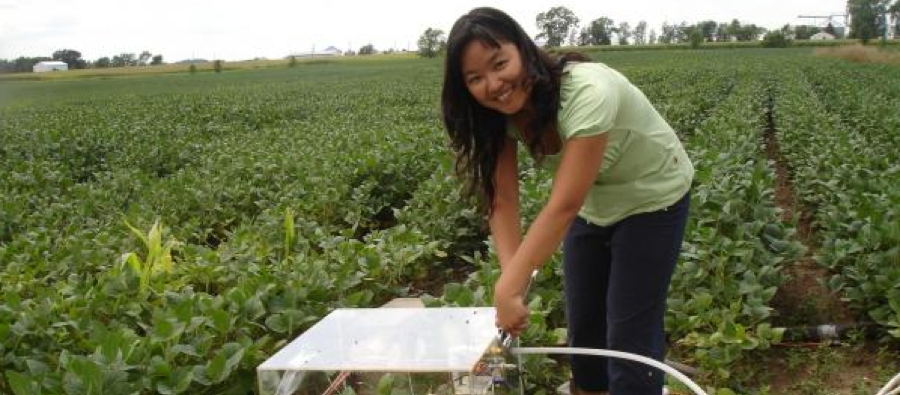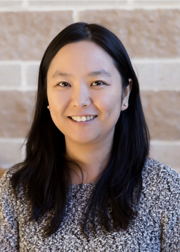As a faculty member at the University of Maryland Center for Environmental Science, I have been developing a non-traditional path in the field of agriculture. I do not cultivate crops or raise animals on a farm. Instead, I study the environmental and socioeconomic impacts of agricultural production and identify strategies to make agricultural production more efficient, sustainable, and resilient. I am not the greatest caretaker of plants; however, I have harnessed my skills in navigating through massive datasets and designing measurements or models to solve issues concerned with agricultural production, on both the farm and national scales. Nevertheless, as part of the solutions to the challenge of farming the planet more sustainably, I consider myself pursuing a career in agriculture, and I would like to encourage more young talents to join the force.
When I was growing up, I never imagined working in agriculture; but I did have a passion for protecting the environment, which I later realized was inseparable from agriculture. Born and raised in suburban China, I developed interests in caring for the environment, but with the stereotype that environmental protection was all about combating pollution from industrial production. Therefore, in addition to my intensive training and interest in chemistry, physics, and computer science, I developed an interest in modelling the dispersion of air pollutants. Consequently, strong quantitative skills and the desire for advancing data-informed environmental policies enabled me to join a research project as a PhD student at Yale University. The project involved quantifying greenhouse gas emissions from crop production in the Midwest United States and provided a unique opportunity for me to connect my passion and skills to agriculture.
Taking measurements on a farm day-in and day-out for two summers and reading the literature on relevant subjects increased my appreciation for the role of agriculture in society and, importantly, also broadened my view of the environment. Indeed, protecting the environment is not only about reducing the pollutants from smokestacks but also about caring for the land that we rely on for food production. In fact, as agriculture accounts for half of the vegetated land, a quarter of greenhouse gas emissions, and 70 percent of freshwater use globally, it should be placed at the centre of environmental protection efforts and the quest for sustainable development.
Ever since my first encounter with research about agriculture, I have been fascinated by the complexity and the dynamics of agricultural systems and motivated to learn more about it every day. Agriculture encompasses all three dimensions of sustainable development: environmental, social, and economic. To make agriculture sustainable, we need to have a comprehensive understanding of agricultural systems, including the key ecological and socioeconomic processes involved and the roles of the key stakeholders.
Given the complexity of agricultural systems, technologies and policies that benefit one dimension may have mixed effects on the other dimensions or even lead to unintended consequences on a broader scale. For example, the intensification of agricultural production may provide more food to the society and spare land from deforestation, but it may result in more irrigation water and fertilizer consumption, lead to more nitrogen pollution, or could encourage the shift of cropping systems from subsistence to cash crops. Thus, I have been developing databases and models to characterize this complex system and to evaluate the effectiveness of different technologies and policies in achieving a sustainable agriculture target. In addition, I have been organizing workshops and meetings to engage more people in discussions and collaborations across disciplines and professions. Working at the interface of multiple disciplines is challenging because it requires stepping out of your comfort zone, learning new knowledge and skills quickly, and communicating effectively; but this is the exciting aspect of my work in agriculture, and it is always rewarding when innovative ideas or projects are developed.
Together with colleagues, I recently published a paper that examines how nitrogen can be used more efficiently in agriculture. We analyzed a 50-year record of agricultural nitrogen use for major crop producing countries around the world, and found that improving the efficiency of nitrogen use in crop production requires not only technological innovation, but also adjustment in many socio-economic conditions, such as crop mix and prices for fertilizer and crop. Consequently, we proposed nitrogen use targets, by geographic region and crop type, to meet the 2050 global food demand projected by the Food and Agriculture Organization while also meeting the Sustainable Development Goals, and recommended strategies for countries to achieve those targets.
Pursuing a career in agriculture in the twenty-first century is no longer limited to traditional farming. Increasingly diversified skillsets and experiences are in demand by emerging agricultural services (e.g., crop modeling, sensor technology, and crop insurance). The grand challenges of doubling agricultural production to feed over nine billion people while addressing the relevant environmental and socioeconomic issues promise a bright future for innovative practitioners in agriculture. That is why I am passionate about my research on agriculture, and that is why I would recommend that young people who are looking for challenging yet promising careers to think about the range of roles in the field of agriculture.
For more from Xin, you can visit her blog. Are you a young professional in agriculture with a story to share? Tweet us using #IamAg to join our campaign to inspire more young people to get involved in agricultural careers.



